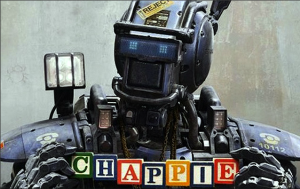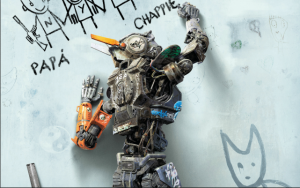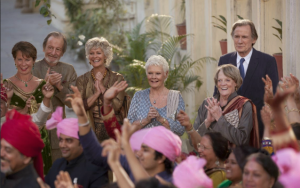RICHARD’S “CANADA AM” REVIEWS FOR MARCH 6 WITH MARCI IEN.
 Richard reviews “Chappie,” “Unfinished Business,” “The Second Best Exotic Marigold Hotel” and “Kidnapping Mr. Heineken” with “Canada AM” host Marci Ien.
Richard reviews “Chappie,” “Unfinished Business,” “The Second Best Exotic Marigold Hotel” and “Kidnapping Mr. Heineken” with “Canada AM” host Marci Ien.
Watch the whole thing HERE!
 Richard reviews “Chappie,” “Unfinished Business,” “The Second Best Exotic Marigold Hotel” and “Kidnapping Mr. Heineken” with “Canada AM” host Marci Ien.
Richard reviews “Chappie,” “Unfinished Business,” “The Second Best Exotic Marigold Hotel” and “Kidnapping Mr. Heineken” with “Canada AM” host Marci Ien.
Watch the whole thing HERE!
 By Richard Crouse – Metro In Focus
By Richard Crouse – Metro In Focus
The word ‘short’ has many meanings.
Pair it with ‘pants’ and it evokes memories of childhood summers. Match it with the syllables ‘and sweet’ and it conjures up a pleasant feeling but when you partner it with the word film, as in short film, you open up a world of possibilities. Just ask Tim Burton, Paul Thomas Anderson or Sam Raimi.
Each of them started by making shorts, several of which were later expanded upon to become well known features.
Burton’s Frankenweenie first saw life as a Disney short way back in 1984. The Dirk Diggler Story is the 1988 mockumentary short written and directed by Anderson that became the basis for Boogie Nights and Within the Woods was the short calling card that helped Raimi get Evil Dead made.
This weekend short films inspired two big releases.
The Babadook is the feature directorial debut of Australian Jennifer Kent. The horror movie plays up the most terrifying aspect of a primal relationship—the bond between mother and child—coupled with a young boy’s fear that a storybook beastie, the titular Babadook, is going to spring from the page and eat them both. The ideas that make The Babadook so unsettling first took shape in a ten minute short called Monster that screened at 40 festivals worldwide.
“I had a friend who had a child that she was really having trouble connecting with,” Kent told Den of Geek. “He was little and he kept seeing this monster man everywhere. The only way she could get him to calm down was to get rid of it as if it was real. And then I thought, well what if it was actually real? That’s how the short idea came about.”
Eleven years ago District 9 director Neill Blomkamp’s short Tetra Vaal asked the question, What would happen if we could build a robot to police developing nations?
The answer may lie in his new feature, this weekend’s Chappie. The South African-born, Vancouver-based director said Chappie is, “basically based on Tetra Vaal,” with the spirit of the South African rap-rave group Die Antwoord infused in the story. The minute-and-twenty-second short features Blomkamp’s signature mix of gritty realism and high tech computer generated images and stars the “ridiculous robot character” with wild rabbit ears—inspired by Briareos from the manga Appleseed—played by Sharlto Copley in the big screen adaptation.
Blomkamp said he made his shorts as “a collection of work so I could get representation as a commercial director,” but they soon opened a world of possibilities for him when they caught Lord of the Rings director Peter Jackson’s eye. To paraphrase Dave Edmunds, “from small things baby, one day big things come.”
 Imagine “Short Circuit” shot with hand held cameras. Or maybe “Bicentennial Man” with better special effects. Or a less politically astute “RoboCop.” No matter how you wire it “Chappie” is a movie that feels like a bucket of nuts and bolts borrowed from other films.
Imagine “Short Circuit” shot with hand held cameras. Or maybe “Bicentennial Man” with better special effects. Or a less politically astute “RoboCop.” No matter how you wire it “Chappie” is a movie that feels like a bucket of nuts and bolts borrowed from other films.
Set next year in Johannesburg, “Chappie” is the story of Scout 22, an “officer” in a droid police force created by arms corporation Tetra Vaal lead designer Deon (Dev Patel). The mechanized cops use ultra-violence to subdue drug dealers, gangsters and other assorted criminal riff raff.
Deon’s creations are a success but he wants his androids to be more than just killing machines. He wants them to think and feel, to write music, appreciate art [and] “have original ideas.”
When Scout 22 is injured in the line of duty, Deon Wilson—counter to Tetra Vaal’s CEO, Michelle Bradley (Sigourney Weaver) and hardline hardware designer Vincent’s (Hugh Jackman) wishes—scoops up the ‘bot’s broken bits and pieces with the idea of reprogramming him to become sentient. “I brought you into this world. A machine that can think and feel,” says Deon.
Before Deon can create his new synthetically sensitive robot, however, he and the pile of damaged droid parts find themselves held hostage by a trio of gangsters, Yo-Landi, Ninja (Die Antoord’s Yo-Landi Visser and Ninja) and Amerika (Jose Pablo Cantillo), who want Deon to shut off Jo’burg’s robocops so they can roam free and pull off a heist with no police interference.
When the terrified programmer explains there is no off switch for the crime fighters, a plan is hatched to turn Scout 22, now dubbed Chappie (a motion-captured Sharlto Copley), into “Indestructible Robot Gangster Number 1.”
The reprogrammed Chappie is “raised” by his “maker” Deon and the gangsters, with whom he forms a defacto family. From Deon he learns creativity; from Ninja and Co. he finds an appreciation of “Masters of the Universe,” street lingo and bling. While Deon is busy trying to prevent Vince from sabotaging the Scout project, Ninja and Amerika manipulate Chappie into doing the one thing he swore he would never do—break the law.
“Chappie” feels like a kid’s movie; a violent and action packed children’s film. The character has a childlike wonder about the world, and there are several almost Disney-esque moments—but the feel-bad Disney where parents die and defenceless characters are left to fend for themselves. Trouble is none of those moments have the same oomph as “Your mother can’t be with you anymore, Bambi.” For all of Chappie’s childlike innocence there’s nothing particularly endearing about him and without an emotional connection to the main character he is little more than a computer with legs and funny rabbit ears.
Director Neill Blomkamp’s trademarked mix of gritty realism and sleek state-of-the-art CGI are present in “Chappie” but one-note performances—I’m looking at you Ninja!—and a story that feels cobbled together from other, better robot movies makes one wish for more intelligence—artificial or otherwise—in the storytelling.
 “Why die there when you can die here?”
“Why die there when you can die here?”
That’s the line in “The Second Best Exotic Marigold Hotel” that explains the motivation of almost every character in the story. The retirement comedy paints old age in broad strokes, but nails the dark humour of the twilight years with clear, concise and funny dialogue.
As we learned in the first instalment, The Best Exotic Marigold Hotel is a slightly ramshackle retirement home in the Indian city of Jaipur. It’s the kind of place where the proprietor, Sonny (Dev Patel) takes roll call every morning to ensure no one has passed on during the night. His guests are mainly British expats looking to comfortably live out their remaining days… and maybe get a new lease on life.
The original hotel is almost fully booked, and with everyone is looking hale and hardy, there likely won’t be many vacancies for some time. Always a big thinker Sonny looks to expand his business with the backing of an American retirement home chain. The first hurdle in deciding whether the Best Exotic Marigold becomes a “franchise or a footnote” is quality test administered by an undercover guest. When two new guests arrive on the same day director John Madden cues the screwball comedy, injecting a mistaken identity element into the feel good story.
“The Second Best Exotic Marigold Hotel” is like a mini-Bollywood epic, there’s a bit of everything—dance numbers, comedy, romance and even a murder plot. Ordinarily that would be too much for a two-hour movie—an attempt to please everyone which usually means you please no one—but here the elements fit together. Sure, sometimes the plot shards creek almost as much as the joints of the oldsters we’re watching on screen, but the goodwill the cast—who much have upwards of a 1000 years of combined screen experience—is the cinematic Voltaren that greases the script’s tired bones.
Of the headliners, Judy Dench is reliably great, touching and sincere while Bill Nighy is heartbreakingly moon-faced in love but it is Maggie Smith who steals the show. She stares down mortality with a mixture of poignantly observed insight and on-target barbs. She delivers lines like, “Just because I’m looking at you while you talk doesn’t mean I’m interested,” and “How was America? It made death more tempting,” with the precision of a neurosurgeon and elevates every scene she’s in.
“The Second Best Exotic Marigold Hotel” is review proof. It’s a charm offensive from a group of actors aiming to please, and for the most part, they do.
 At a time when many directors are leaving Bollywood for less exotic locations, Irish director Danny Boyle, following in the footsteps of Wes “Darjeeling Limited” Anderson, set his latest film in the New York of India, Mumbai, the most populous city in the world. Taking the lead from its setting Slumdog Millionaire is a chaotic movie; part nightmare, part fairy tale.
At a time when many directors are leaving Bollywood for less exotic locations, Irish director Danny Boyle, following in the footsteps of Wes “Darjeeling Limited” Anderson, set his latest film in the New York of India, Mumbai, the most populous city in the world. Taking the lead from its setting Slumdog Millionaire is a chaotic movie; part nightmare, part fairy tale.
When we first meet Jamal Malik (Dev Patel), he’s an eighteen-year old orphan at a crossroad. As a contestant on India’s Who Wants To Be A Millionaire? he is just one question away from winning it all—20 million rupees, but as the show breaks for the night he is arrested for cheating. After a brutal night of questioning he begins to tell his story in an attempt prove his innocence. Told primarily in flashbacks Jamal recounts a troubled life in the slums of Mumbai with a violent brother and a mother killed when he was just a child. The only ray of hope in his life was Latika (Freida Pinto), an orphan girl who enters and exits his life. Each story reveals the life experience that taught him the answers to the game show’s questions; all set against the vibrant backdrop that is India.
Slumdog Millionaire is a wild ride from Boyle’s hyper visual style, to the pulsating musical score, to the elements of the story that binds together Romeo and Juliet, Bollywood gangster pictures, the Usual Suspects and an occasionally tender coming-of-age story. Boyle pulls out all the stops, leaving the quiet, austere feeling of his last film, Sunshine behind for a frenetic pace that assaults the senses—in a good way. Like the slum lifestyle he portrays the film is relentless, a barrage of images, music and sound. His characters are constantly on the run, and the movie is just as restless as they are but luckily for us Boyle keeps the story on track pushing it forward with every frame.
Boyle is a chameleon of a filmmaker, switching styles with every film, but he is a master of telling realistic stories with complicated parallel character threads. From the edgy Trainspotting to the heartwarming Millions to the intense 28 Days Later his films are immersive experiences that use images and music to maximum effect. Slumdog Millionaire is his most complex movie yet encompassing everything from romance to action, comedy to anguish, treachery, greed and yes, even a musical number (stay through the credits!). Exhilarating filmmaking and one of the year’s best.